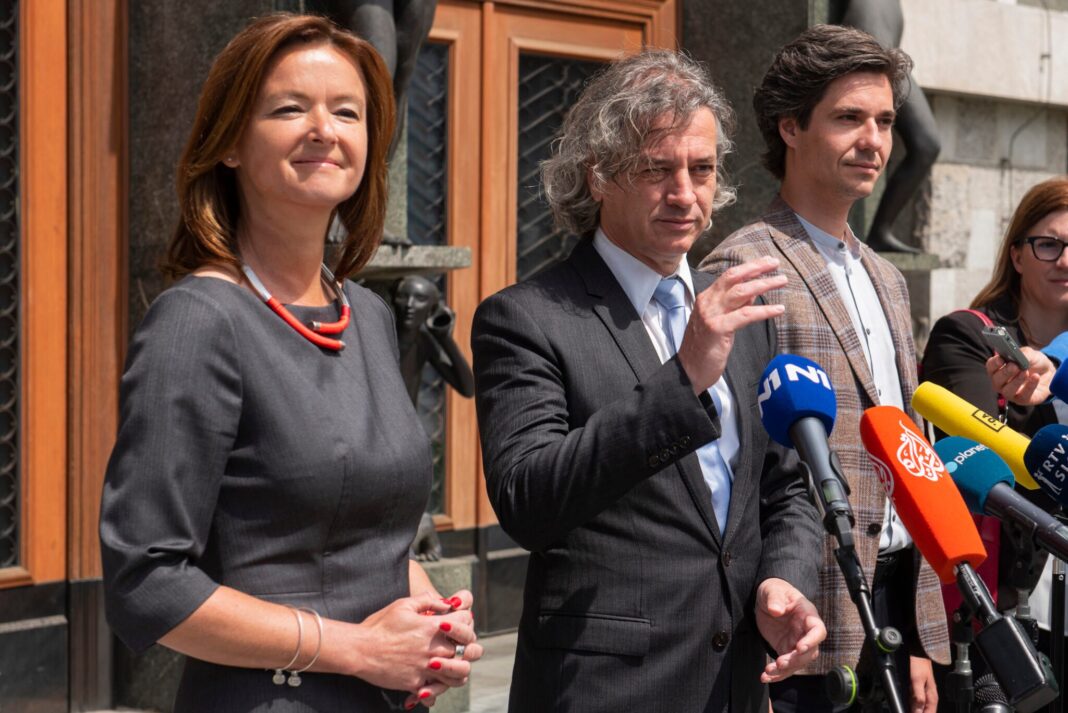By Sara Kovač (Nova24tv)
Last week, the government of Robert Golob fully supported the amendment to the Radio-Television Slovenia Act, which was submitted to the National Assembly by the coalition deputies, with the first signatory being Mojca Šetinc Pašek, and Golob said that they will manage to “resolve the situation” at RTV Slovenia by the end of the year at the latest. However, it is also quite possible that they will not even wait for the new law to enter into force – it is rumoured that an early recall of the 21 members of the current RTV Slovenia Programme Council will happen soon.
Journalist Bojan Požar published some unofficial information on Twitter, namely that an early recall of the 21 members of the RTV Slovenia Programme Council will supposedly happen soon. He explained that the lawyer Dino Bauk, Minister of Culture from the Left party (Levica), Asta Vrečko, MPs from the Freedom Movement party (Gibanje svoboda), Mojca Pašek Šetinc and Tamara Vonta, and professor Marko Milosavljević are all involved in the preparations for the recall. “And keep in mind that this has never before happened in the history of independent Slovenia, and the government coalition wants to do it before the summer holidays of the National Assembly,” the editor of the Požareport media outlet added.
The coalition is engaging in criminal actions
We asked some members of the Programme Council if they already know anything about this intention, but we have not yet received an affirmative answer. “Nothing has been said yet about any replacements happening at the Supervisory Board. We may not be important enough in terms of maintaining the hegemonic discourse on RTV. Or perhaps even the “Freedom coalition” has recognised that the Supervisory Board is doing good work, given the two-million surplus in the first quarter of 2022,” said the Chairman of the Supervisory Board, Dr Borut Rončević. We asked a legal expert to tell us on what legal basis could such a quick recall of members of the Programme Council be carried out, and he shared his belief that in this case, the dismissal of the programme councillors would, in all probability, be (knowingly) done illegally.
The revolutionaries against the legal system
Member of the Programme Council, Vane Gošnik, told our media outlet that the initiators of the recall – if Požar’s information is correct – will have immense difficulties in realising this. Namely, the councillors were elected legally by a majority vote in the National Assembly – and thus, they also acquired the right to be councillors, and no law can revoke this right in retrospect. At this point, Gošnik also reminded everyone of the previous rulings of the European Court of Human Rights, which stipulate that, except in exceptional cases, the assigned functions cannot be revoked retroactively. According to Gošnik, this would therefore lead to major complications – if not sooner, at least at the Constitutional Court, where they have to take into account the previous rulings of the European Court of Human Rights. “What is legal and what is not is decided by the court,” Gošnik responded to some allegations claiming that the current members were elected illegally, stressing the absurdity of the requirement that candidates in councils correspond to the ratio of parties represented in the National Assembly. How is this even feasible if the vote is secret? In short, it seems that some kind of revolutionary law is being practised by Golob’s government, but they also find out sooner or later that not everything is feasible. In all likelihood, the same thing will also happen here.
The programme councillor also mentioned that Slavko Splichal – who is also a member of the council – called on his colleagues to resign collectively at the next council session – whatever that is supposed to mean. However, it is also true that the most elegant solution for Golob’s government would be for the RTV Programme Council to resign on its own. At the end of our conversation, Gošnik also briefly spoke about the strike, pointing out that the trade union should, by its very nature, be fighting for better conditions for employees and for their salaries – however, in the case of RTV, the trade union is engaging in political activism, as they are demanding a change in management and the governing bodies. “What this has to do with the trade union’s goals, I do not know,” Gošnik pointed out, who believes that it is also evident from the case that the deep state is not that deep at all but is actually all on the surface – as the psychoanalyst Dr Nina Krajnik already pointed out.
Today, the government of Robert Golob continued implementing its tsunami of personnel change in other areas as well – they replaced members of the boards in nine hospitals, allegedly due to poor operating of the institutions themselves. The government reappointed the representatives of the founder at the Institute of Oncology Ljubljana, in both University Medical Centres, in general hospitals Celje, Slovenj Gradec and Murska Sobota, and also in the Psychiatric Hospital Begunje, the Kranj Gynaecology and Obstetrics Hospital, and in the University Clinic of Pulmonary and Allergic Diseases Golnik. By replacing members of the councils of these institutions, the government will first try to stabilise the situation and then ensure positive operations before the end of the year, the Slovenian Press Agency reports.

